Summary
- Google Data Analytics Professional Certificate (Coursera, Beginner) – Starts with spreadsheets you already know, sneaks in SQL and R, and leaves you with portfolio projects. Google’s logo on it doesn’t hurt when emailing recruiters either.
- IBM Data Analyst Professional Certificate (Coursera, Beginner–Intermediate) – Data cleaning when sources betray you, analysis when patterns hide, dashboard construction in Cognos and Tableau when stakeholders demand visuals. The technical bar is set a bit higher than Google’s welcome mat.
- CompTIA Data+ (Vendor-Neutral, Intermediate) – Just you, an exam, and questions testing whether you can mine data, analyze the mess, visualize what matters, and govern it all without creating compliance troubles.
- Microsoft Certified: Power BI Data Analyst Associate (Intermediate) – Validates you’re building functional Power BI environments where dashboards refresh automatically, DAX formulas solve business calculations, and Power Query prepares incoming chaos.
- Certified Analytics Professional (INFORMS, Advanced) – Proves you can frame strategic problems, select methodologies that hold up, build predictive models that don’t implode on contact with reality, and deploy solutions people bet their budgets on.
Every data analyst, at some point in their career, faces the question of certification. While skills are the most essential factor in being hired, the best data analytics certifications provide an advantage and help you stand out. They scream, “I have proof.”
But the bag is mixed: hundreds of certifications compete to hold your name, spanning Google’s accessible entry-level option to INFORMS’ CAP – the field’s gold standard – making selection genuinely difficult.
We’ve identified the data analytics certifications that employers recognize and respect in 2026. If you’re considering an update, start here. These are the credentials that move careers forward, not just fillers for a LinkedIn profile.
Table of Contents
- Why Get a Data Analytics Certification?
- Top Data Analytics Certifications for Beginners
- Top Data Analytics Certifications for Intermediate Professionals
- Top Data Analytics Certifications for Advanced Professionals
- Comparison Table of Top Data Analytics Certifications
- How to Choose the Right Data Analytics Certification for You
- Conclusion
Why Get a Data Analytics Certification?
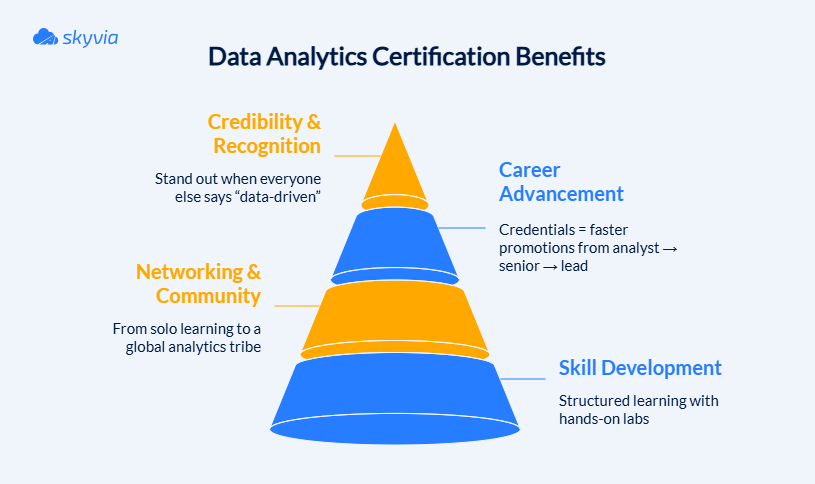
Certificates ≠ trophies
The value shows up practically – interview doors swing open more quickly, salary offers improve, and “thanks but no thanks” emails decline. With every business branding itself as data-obsessed, a certificate communicates your competence without explanation.
Self-taught learners get structure. Career switchers gain credibility. Curious explorers find confirmation that their database queries weren’t just procrastination with purpose.
Credibility and Recognition
The market grows quickly, offering many opportunities for people with all levels of skills, which is both good and bad. There will be lots of other candidates waiting for the same interview.
A certification will help to show that your expertise exists not only in a few lines of a CV. You can be the most talented and creative data analyst out there, but employers can’t read minds; they need signals.
- Third-party proof: Google/IBM/Harvard branding tells hiring managers you’re investing in your professional growth.
- Skills, not vibes: Curricula map to SQL, Python/R, and BI tools, no mystery meat.
- Searchable badges: Shareable credentials surface you in recruiter filters.
- Trust multiplier: Helpful when you’re pivoting careers or competing with degree-heavy resumes.
Career Advancement
For those who have already reached the “become a data analyst” milestone, certifications help them move further in their career. New position, new specialization, new skills, etc. Certificates won’t do your job for you, but they do open more doors and often better-paid ones.
- More interviews: Many teams use credentials as a quick screen for junior roles. Also, a nice, shiny badge on LinkedIn increases the chances that a hiring team will reach out to you with an interesting offer on their own.
- Pay lift: Certified analysts often start to earn 20-30% higher compared to their colleagues without credentials within 12-18 months of certification, depending on role and region.
- Faster steps up: Useful proof when arguing for that “analyst → senior analyst” jump.
- Mobility: Easier to move across functions (marketing, ops, finance) with a known credential.

Skill Development
DIY learning is great, until you miss the pieces and connections between related topics become too tangled.
Starting on your own is great, but at some point, you’re likely to encounter questions that only those who have made this path earlier can answer.
- Structured path: From data cleaning to visualization to basic ML, in the right order.
- Labs mirroring real work: You’re querying data, plotting results, explaining patterns – what the job demands.
- Tech stack that ages well: SQL, Python or R depending on preference, Excel for mundane tasks, Tableau/Power BI for visual communication, and AI augmenting workflows.
- Portfolio fuel: Capstones are solid enough to feature when interviewers ask what you’ve accomplished.
Networking Opportunities
You’re not just earning a stamp, you’re joining a room. DIY learning gives you the base, but you’re still a very lonely analyst in this new world.
Networking with a certificate is much more effortless than trying to make acquaintances without such support.
- Learner communities: Peer help, study groups, and code reviews keep momentum.
- Mentors & instructors: Q&A forums and office hours = fewer dead ends.
- Backdoor opportunities: Networks of graduates and partner employers expose roles you’d never find scrolling job sites.
- Keeping pace: Regular updates and events from providers track shifts in tools and techniques.
A certificate confirms your capabilities, refines them through repetitive practice, and connects you to people who can fast-track your journey. With demand exploding and salaries climbing, it’s a smart time commitment.
Top Data Analytics Certifications for Beginners
If you’ve ever tried teaching yourself analytics on YouTube, you know the drill – 27 tabs open, contradictory advice, clickbait covers about “the best SQL trick everyone should know.” Now, let’s try the other way around.
Best data analytics credentials hand you a roadmap, tested exercises, and a shiny credential to prove you didn’t just binge tutorials.
Below are three beginner-friendly certifications that help you go from curious to competent – and job-ready.
Note: Some of the certifications on this list require completing a course for data analysts first. In contrast, others (usually they require a few years of experience) are exams without mandatory preparation.
Google Data Analytics Professional Certificate
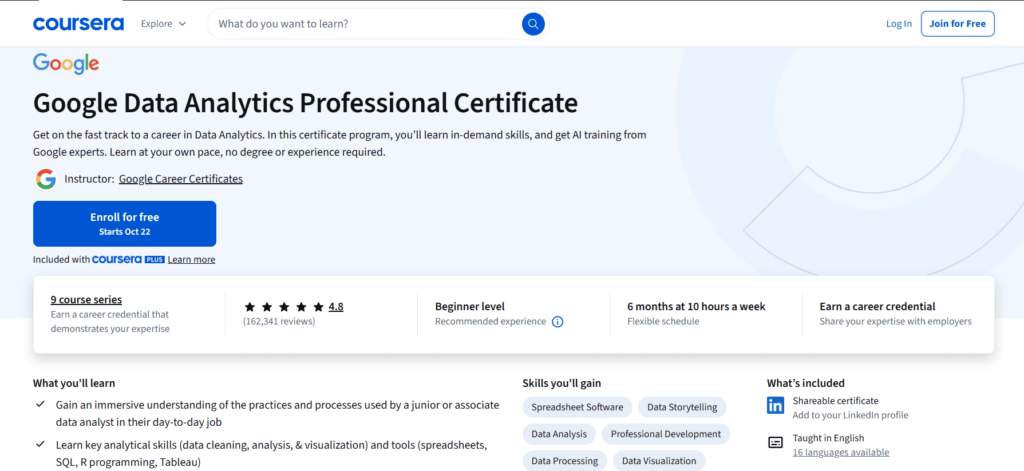
Think of this as the Netflix of learning – polished, bingeable, and strangely addictive once you get past the intro screen.
The Google Data Analytics Professional Certificate is definitely among the top data analytics certifications created to turn absolute beginners into confident analysts using real data, not canned examples. It’s practical, flexible, and somehow makes R less intimidating than it sounds.
Provider
Google, offered through Coursera, features AI-assisted modules powered by Gemini.
Ideal For
Absolute beginners: no degree haunting your past, no experience weighing you down, no barriers. Built for career switchers tired of their current path, students testing the waters, or anyone seeking industry-validated entry into analyst roles spanning tech, finance, marketing, and healthcare industries.
Skills Covered
You’ll move from raw spreadsheets to R scripts, learning how to:
- Clean, analyze, and visualize data using Sheets, SQL, R, and Tableau.
- Build dashboards, apply data ethics, and present findings clearly.
- Use AI tools like Gemini for automation, prompt writing, and interview prep.
- Create a portfolio that proves your skills, not just says you have them.
Every module comes with quizzes, labs, and case studies from real business scenarios. By the end, you’ll have a small portfolio of projects and the confidence to call yourself an analyst – not just a spreadsheet enthusiast. And, of course, a shareable certificate to add to your LinkedIn profile.
Cost
Free to audit. Certificate available through Coursera Plus (~$35/month), with a 7-day free trial.
Duration
Around 4 months at 10 hours/week (~150 hours).
IBM Data Analyst Professional Certificate
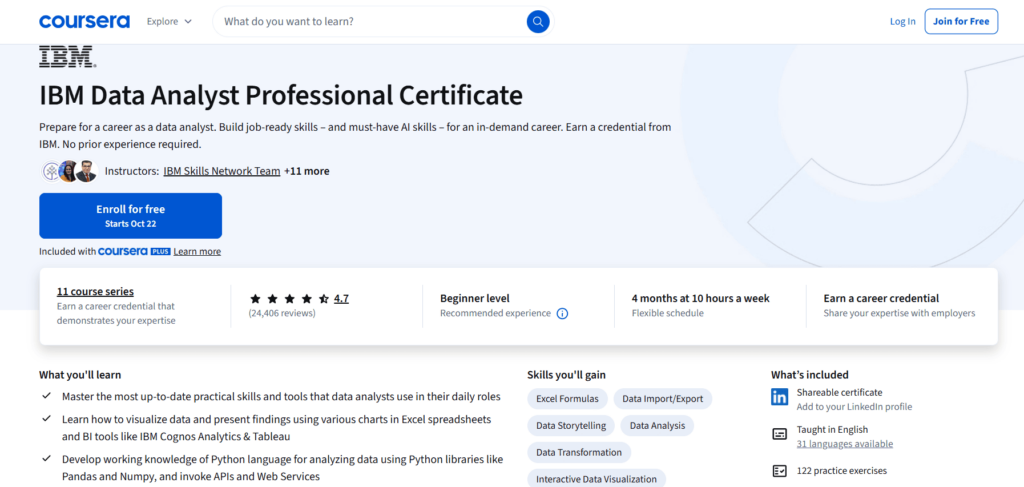
IBM created its Data Analyst Professional Certificate for people who prefer writing Python over dragging cells in Excel. It’s hands-on, technical, and full of “aha” moments when things finally click.
It’s stackable – this certificate counts toward college credit and IBM’s advanced data science tracks. Additionally, you will receive an IBM Digital badge and have access to career tools to aid in your job search.
Provider
IBM, offered through Coursera, is led by practicing data scientists.
Ideal For
Beginners who’d rather dive into Python scripts than spreadsheet filters. It’s a great bridge toward data science or engineering later on.
Skills Covered
IBM’s Certification focuses on building muscle memory for real analytical workflows.
- Core Tools: Python (Pandas, NumPy, Matplotlib, Seaborn), SQL, Excel, Tableau, and IBM Cognos Analytics.
- Advanced Topics: APIs, web scraping, data lakes, and regression modeling.
- Capstone Project: A full analysis pipeline where you build and present dashboards, reports, and visual insights.
- AI Additions (2025 update): Generative AI use cases, prompt design, and automation workflows for analysis tasks.
Cost
$35 a month with Coursera Plus. The Certification comprises 11 course series (around 174 hours in total). You can work at your own pace, which will affect the final price.
Duration
Ten hours a week for around four months (about 160 hours altogether). Enough flexibility to expand or contract based on your schedule.
CompTIA Data+
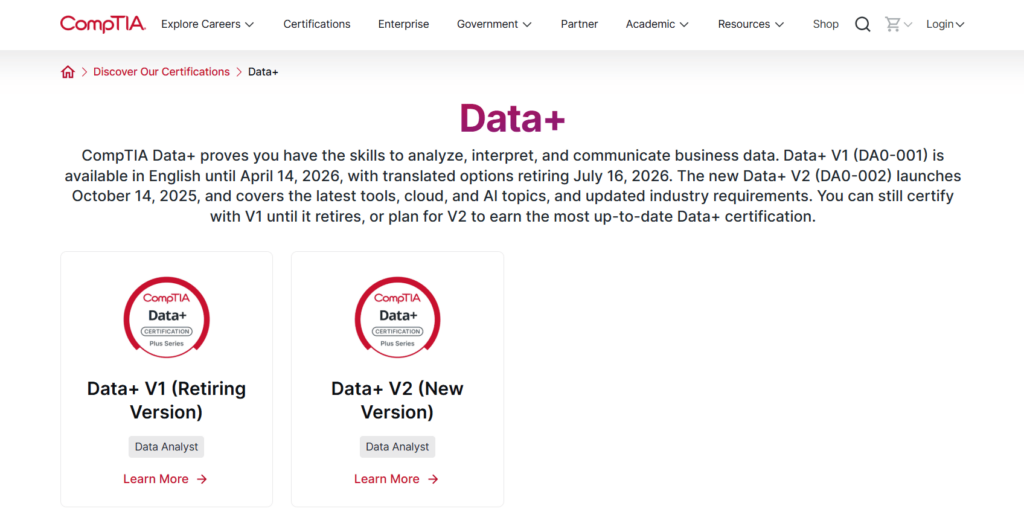
Google teaches you the moves. IBM lets you practice them. CompTIA Data+ tests whether you can handle data when it’s not cooperating – under time constraints, with real consequences for wrong answers. There’s no hiding behind tutorials or instructor guidance here.
Either you understand data pipelines, customer data integration (CDI), and real-world data flow, or the exam exposes that gap quickly.
Provider
CompTIA is a long-standing certification authority trusted by IT departments everywhere. Unlike Google or IBM, this one isn’t tied to a platform – it’s fully vendor-neutral, meaning your skills translate across tools.
Ideal For
Beginners or early professionals who want a formal credential without subscribing to a course platform. Ideal for those in IT, business analysis, or operations who need to prove they can interpret data – not just collect it.
Skills Covered
- Data concepts and environments (about 15% of the exam) – databases, data lakes, data warehouses, data marts, etc., schemas, file formats, data types, etc.
- Data mining (25%) – APIs, web scraping, surveys, ELT workflows, etc. Data cleansing, manipulation techniques, etc.
- Data analysis (23%) – Descriptive methods, inferential techniques, exploratory analysis, trend analysis, etc.
- Visualization (23%) – Dashboards, reports for specific audiences, charts, data mapping, etc.
- Data governance, quality, and controls (14%) – Safety measures, access management controls, compliance requirements, security protocols, quality controls, validation rules, etc.
Cost
The exam fee is $225 USD. Optional study bundles range from $100 to $500. No recurring subscription.
Duration
Reserve 90 minutes for the exam.
Prerequisites
- You’ll need to hit 675 points minimum (the scale runs 100 to 900, so that’s passing but not exactly coasting territory).
- CompTIA also suggests 18-24 months doing actual analyst work first: running reports, talking to databases, understanding statistics beyond “average means add then divide,” and building visualizations that don’t immediately confuse everyone who looks at them.
- CompTIA also offers courses, labs, and student guide ebooks (which can be bought separately or with the Data+ Certification).
Top Data Analytics Certifications for Intermediate Professionals
If you’re not a padawan anymore, but not a Jedi master yet, this stage is for you. You’re in the second season of your analytics career – the plot thickens, the tools get smarter, and the learning curve starts to resemble a knot at some points. But fret not, here are credentials to cut it.
Microsoft Certified: Power BI Data Analyst Associate
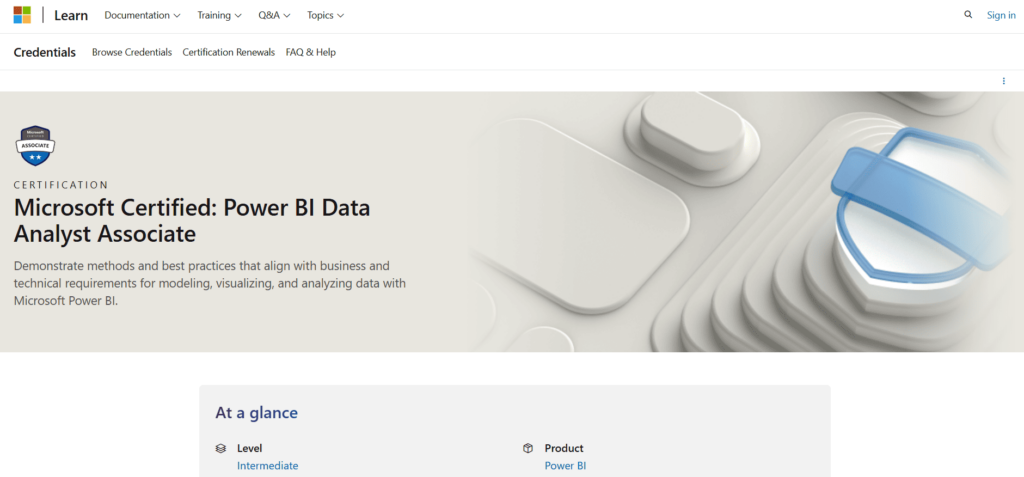
If data visualization were a sport, this certification would turn you from a casual gym-goer into someone who can coach a team. The Power BI Data Analyst Associate (PL-300) is about designing reports that answer tough business questions without breaking the data model behind them.
If this description sounds a bit too scary, you can take a demo test to decide whether the time has come, or if it’s better to choose something else for now. Also, the platform provides video content to help you prepare, and if you fail, you can make another attempt within 24 hours of your first try.
Provider
Microsoft – delivered through the PL-300 certification exam and the official Microsoft Learn platform.
Ideal For
People who have been analyzing data or working in BI for a year or two, with Power BI and Excel already part of their routine, now want proof that they can turn data messes into insights executives use. Works for professionals across various industries.
Skills Covered
Power BI mastery from data import to polished dashboards, including:
- Preparing data – cleaning, profiling, transforming, and loading from multiple sources.
- Modeling – defining relationships, optimizing queries, and writing DAX formulas that actually make sense six months later.
- Visualizing & analyzing – creating dashboards with AI visuals, custom themes, and interactive forecasting.
- Managing & securing – controlling workspace access, gateways, and row-level security.
Cost
The price varies by region. For example, applicants from the US will need to pay $165. In Europe, it’s around €126.
Duration
~21 hours across 21 modules.
Prerequisites
- Entry is open and there are no formal barriers, but lacking Power Query experience, DAX knowledge, or data modeling basics might turn the exam from challenging into punishing.
- Certificate lasts exactly 12 months before renewal becomes mandatory, keeping your credential from becoming outdated, proof of what you knew last year.
- It’s recommended to register for an exam with your personal Microsoft account. If you use a corporate one, the certificate will be lost if you leave the company.
Visual Business Analytics Using SAS Viya (Instead of SAS Certified Advanced Analytics Professional)
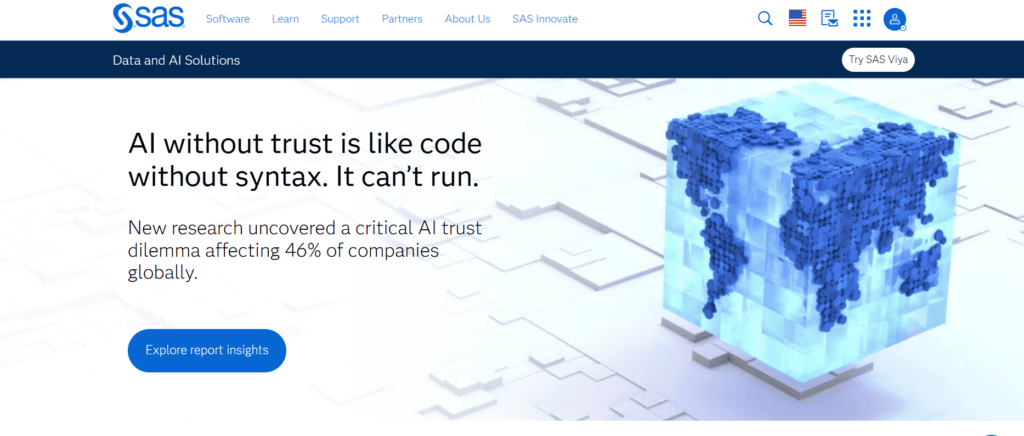
Mid-2025 marks the sunset of one of the most popular certificates for data science specialists – SAS Certified Advanced Analytics Professional, but anyone verified beforehand keeps their credentials, and the respect attached to it doesn’t expire. However, those looking for a SAS certificate can take a newer one – Visual Business Analytics Using SAS Viya.
SAS Viya is an enterprise giant built for massive datasets, predictive modeling, and reports that do more than just look pretty. This certification proves you can take complex data and turn it into visuals that help people make smarter choices. It’s not a “click-next” badge – this one asks for trained brains, patience, and a bit of flair.
Also, there’s a prep SAS Viya course on Coursera aligned with the certification.
Provider
SAS Institute – a global American company that creates software for analytics and artificial intelligence.
Ideal For
- Business or data analysts working with SAS Visual Analytics.
- Report developers who want to design dashboards that go beyond basic charts.
- Students or educators using SAS in research or coursework (academic discounts available).
- It’s especially relevant for organizations running on SAS Viya – finance, healthcare, and manufacturing rely on it heavily for governed, scalable analytics.
Skills Covered
It’s a hands-on test of real-world visualization skill – from cleaning up data to designing visuals that explain, not confuse:
- Data Preparation & Management (~35%): importing and managing multiple data sources; creating joins, aggregates, data views, and mappings; building custom data items; applying filters, sorts, and ranks.
- Visual Analysis & Reporting (~55%): designing interactive reports; creating diverse visuals; incorporating different visuals; building custom graphs and adding interactivity; using containers and embedding text, images, or web elements.
- Report Distribution & Management (~10%): viewing and sharing reports across web, mobile, and Microsoft 365; exporting visuals, managing report versions, localization, thresholds, and data limits.
Cost
Exam Fee: $180 USD (lower with student discounts). The certificate expires after 5 years, but there are no renewal fees. You will need to repeat the process.
Duration
- The exam lasts approximately two hours and can be administered via Pearson VUE or, if you’re willing, in one of the test centers.
- The SAS Viya course on Coursera is 30 hours across five series.
Prerequisites
No hard requirements, but it’s not a beginner’s stroll either. You’ll have to be familiar with:
- SAS Visual Analytics on Viya (or SAS 9.4).
- Data concepts and visualization principles.
The Coursera track is a gentle entry point – no prior programming experience needed, just curiosity and consistency.
Top Data Analytics Certifications for Advanced Professionals
When it’s time to step up, advanced data analytics certifications test whether you can design models that matter, manage end-to-end analytics workflows, and back every decision with statistical firepower. You’re graduating from “building reports” to “guiding the boardroom,” from analyzing data to commanding it.
Certified Analytics Professional (CAP)
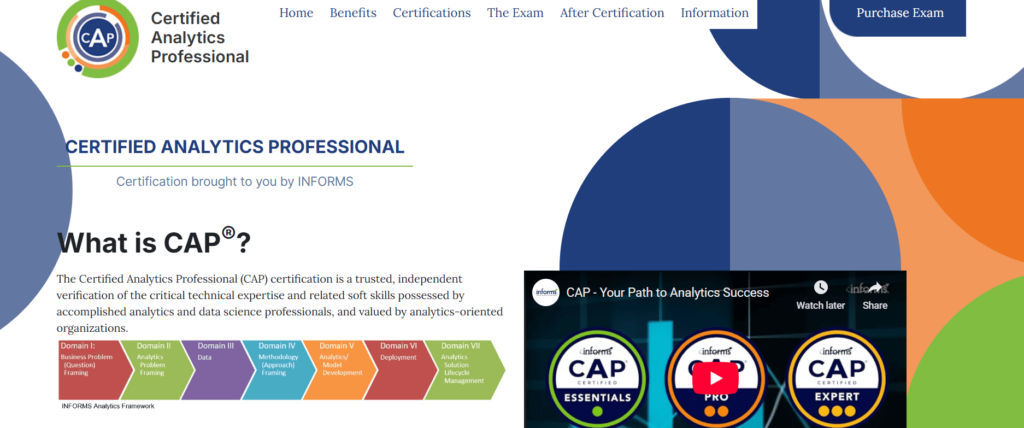
The Certified Analytics Professional earns serious credibility for advanced positions by validating technical knowledge and communication skills together rather than separately. Reviews across platforms position it as rigorous and practically applicable, especially in finance and healthcare environments where data decisions matter.
Provider
INFORMS (Institute for Operations Research and the Management Sciences) – an independent, vendor-neutral authority in analytics and operations research.
Ideal For
CAP expects you’ve already put in 3-5+ years doing analytics – the kind of experience where you can look at messy data and immediately know what’s wrong and how to fix it.
Senior analysts, consultants, and analytics managers get the most value, particularly those wanting credentials proving broader expertise than any single tool provides. Strategy, ethics, and explaining complex things simply matter just as much here as technical ability.
However, there’s also aCAP level certification, suitable for beginners, and you can prepare for and take the official INFORMS CAP Prep Course.
Skills Covered
It covers seven key domains that mirror how analytics happens in the wild:
- Business Problem Framing – Spotting the real question hidden behind a vague business request.
- Analytics Problem Framing – Translating that question into something data can answer.
- Data Acquisition and Preparation – Getting data in shape for serious modeling.
- Approach Determination – Identifying which statistical or machine learning strategy addresses your specific challenge.
- Design and Verification – Crafting, probing, and improving models until they demonstrate consistent reliability.
- Deployment and Operations Integration – Taking models from experimental code and embedding them into business operations where they generate value instead of sitting idle.
- Model Life Cycle Management – Keeping analytics assets useful, ethical, and up to date.
Cost
- The application fee is $55 (nonrefundable), and yes, you may not be approved to take the test.
- The exam fee is $440 for an INFORMS Member and $640 for a non-member.
- The aCAP exam fee is $150 for members and $245 for non-members.
- The renewal fee is $300.
- The Prep Course is $660 (for members) and $980 (for non-members). Cheaper, non-official options can be found on learning platforms like Udemy.
Duration
- The test takes three hours.
- The prep course lasts around four weeks.
Prerequisites
- Entry criteria: Bachelor’s and five years doing analytics, or master’s and three years (non-analytics majors need seven years altogether). Candidates must sign the ethics statement and supply a reference. Prior certifications are unnecessary, though real analytics role experience determines whether you’ll pass.
- Test format: 100 multiple-choice items, online or testing center options.
- Industry perception: Strong standing, regularly featured in top certification rankings.
- Active period: Three years and requires 60 professional development units (PDUs).
Comparison Table of Top Data Analytics Certifications
| Certification & Provider | Ideal For | Key Skills | Cost | Duration |
|---|---|---|---|---|
| Google Data Analytics Professional Certificate (Coursera) | Beginners and career changers starting from zero | Data cleaning, analysis, visualization (Sheets, SQL, R, Tableau), AI tools (Gemini), portfolio projects | Free to audit; ~$35/month for certificate | ~4 months at 10 hours/week |
| IBM Data Analyst Professional Certificate (Coursera) | Beginners going technical, aiming for data science or engineering later | Python (Pandas, NumPy), SQL, Excel, Tableau, Cognos, APIs, regression modeling, AI automation | ~$35/month (Coursera Plus) | ~4 months at 10 hours/week |
| CompTIA Data+ (CompTIA) | Early professionals seeking vendor-neutral validation | Data mining, cleansing, analysis, visualization, governance, compliance | $225 exam; prep bundles $100-500 | Test lasts 90 minutes |
| Microsoft Certified: Power BI Data Analyst Associate (Microsoft) | Mid-level analysts with 1-2 years of BI experience | Power Query, DAX, modeling, dashboarding, security, AI visuals | ~$165 (varies by region) | Flexible; ~21 hours |
| Visual Business Analytics Using SAS Viya (SAS Institute) | Analysts or report developers in SAS environments | Data prep, interactive reporting, forecasting, geographic and predictive visuals, and report distribution | $180 | Exam – approx. 2 hours; prep course – 30 hours |
| Certified Analytics Professional (CAP) – INFORMS | Senior analysts, consultants, or managers (3-5+ years of experience) | Full analytics lifecycle: problem framing, modeling, deployment, lifecycle management | $495 (INFORMS members) / $695 (non-members); prep ~$660+ | Exam – 3 hours; prep course – 4 weeks |
How to Choose the Right Data Analytics Certification for You
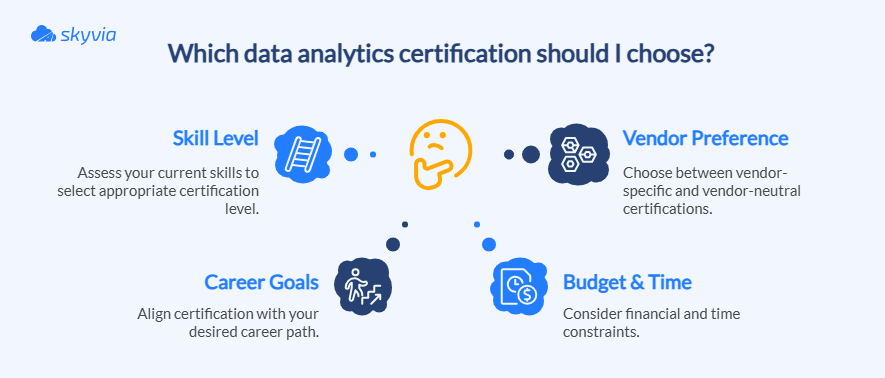
Certification shopping shouldn’t resemble doom-scrolling course catalogs at midnight until something sounds impressive enough to screenshot.
You need coordinates: where you’re parked right now, skill-wise, where you’re trying to drive, career-wise, and whether the toll roads between them will bankrupt your time, wallet, or sanity before you arrive.
Assess Your Current Skill Level
Prior to spending anything on certification attempts, perform a ruthless self-assessment – pretend you’re explaining your current abilities to someone who’ll fact-check every claim by watching you work.
You can use ChatGPT, Grok, Claude or whatever AI you like better for this evaluation. Describe what you know, and it’ll help pinpoint the gaps, showing which courses could fill them and which certification best fits your current skill set.
- Beginners: No stats background? No problem. Start with something like Google or IBM’s certificates on Coursera – both hold your hand through SQL, Python, and basic visualization.
- Mid-career analysts: You already speak DAX or BI fluently? Microsoft’s Power BI Data Analyst Associate or CompTIA Data+ (CompTIA) might fit better.
- Veterans: If you’re already knee-deep in data models and stakeholder meetings, go for CAP or Visual Business Analytics Using SAS Viya. These prove strategy and leadership chops, not just tool skills.
Define Your Career Goals
Every certification opens a different door. Ask yourself: what room do you want to enter?
- Career switch or first analyst job: Google’s and CompTIA’s programs are safe bets – practical, respected, and fast-tracked to job boards.
- Specialization: Go deep, not wide. SAS or CAP if you dream in models and algorithms.
- Industry focus: Finance and healthcare love CAP’s ethics and governance pieces.
Tip: Look at job posts on LinkedIn – if the same certificate keeps popping up, that’s your signal.
Consider Your Budget and Time Commitment
Cost varies from “skip brunch twice” to “explain to your landlord why this month’s tight,” with timelines ranging from weekend sprint to months-long marathon.
- Budget picks: Google & IBM (~$35 per month). Free to audit if you just want to learn.
- Mid-tier: CompTIA Data+ (~$338 exam) or Microsoft PL-300 (~$165).
- Premium: CAP (~$695 exam + prep). Serious coin, serious recognition.
Vendor-Specific vs. Vendor-Neutral
The question that splits analytics careers: lock into one vendor’s world or maintain independence?
- Vendor-specific: Google, Microsoft, or SAS Viya – great if your company already runs on those tools. You’ll master every menu and shortcut, but you’re locked in if the tech stack changes.
- Vendor-neutral: CAP or CompTIA – tool-agnostic and broader, focusing on principles that age well.
Conclusion
Data analytics isn’t just another career path – it’s the heartbeat of modern decision-making. Every product launch, campaign, or quarterly forecast depends on people who can make sense of the numbers behind the noise. Certifications get you there – they prove you’ve got the skills to move from curiosity to clarity.
The key takeaway? There’s no single “best” certification – only the one that fits your goals and your current stage. Google’s program might open the first door, Microsoft’s could sharpen your BI edge, and CAP might be your ticket to strategic roles.
But remember, analytics doesn’t happen in isolation. Every insight starts with clean, connected data – and that’s where tools like Skyvia come in. It’s a no-code platform that helps analysts integrate data from CRMs, cloud apps, and databases into one place – so your dashboards, models, and reports tell the full story.
The best analysts don’t just read data – they connect it, shape it, and turn it into impact.
F.A.Q. for Top Data Analytics Certifications
Are data analytics certifications actually worth it in 2025?
Certifications prove capability, improve credibility, and unlock higher-paying positions you’d otherwise get filtered out of.
How much do data analytics certifications typically cost?
Free (audit options) to $700+ (advanced exams like CAP). Most Coursera programs charge $35 monthly – total cost varies based on how quickly you complete.
How long does it take to complete a data analytics certification?
Beginner certifications: 3-6 months part-time. Advanced credentials like CAP: several months of preparation plus exam scheduling and potential retakes.
Do I need to know how to code to get a data analytics certification?
Not necessarily. Beginner programs frequently start with Excel, Power BI, and Tableau—visual tools requiring no code. Programming concepts arrive later after comfort builds with analytics thinking.


